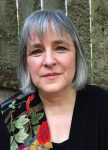On Feb. 1, Sarah Peyton speaks at Or Shalom on the topic Why Love is Not Enough: Family Heartache and the Path of Repair. (photo from Or Shalom)
Have you ever longed for someone who would be able to listen to you without judgment, to every concern, fear, yearning or hurt you might have? Someone able to hold you in gentle understanding and with deep compassion all the time? Such a person does exist – within yourself. And you can find out how to meet them through the work of Sarah Peyton.
Peyton is a neuroscience educator and certified trainer of nonviolent communication, which was pioneered by American psychologist Marshall B. Rosenberg. She will introduce the latest understanding of neuroscience and the part it plays in building social and family relationships in her talk at Or Shalom on Feb. 1, called Why Love is Not Enough: Family Heartache and the Path of Repair. Peyton will show how deep, resonant empathy for oneself and the other can connect conflicting parties, even as the conflict resides within one’s own inner voice of criticism.
I met Peyton in the summer of 2015. My husband was assisting in a nonviolent communication retreat, and I had been asked to facilitate a writing session as a part of it. At the last minute, I painfully withdrew. My mother’s death, less than two years before, had left me paralyzed and in deep grief and mourning. I was not up to the task of supporting anyone, not even myself. Tearfully, I watched as my husband left for the weekend. Miraculously, my husband forgot something he needed and returned home to retrieve it. “Come back with me,” he urged. “Don’t facilitate. Just sit outside, swim, write under the trees. Get well.” I said, “Yes.”
That weekend changed my life. Peyton warmly guided a group of participants in her process of resonant language and connection. Peyton, I would come to learn, had lost her beloved son just the year before. Given that, how was it possible that she could contribute with such presence?
Over the next two years, I worked privately with her, learning about resonant language and how to live it. Last year, Norton Press published Peyton’s first book, Your Resonant Self: Guided Meditations and Exercises to Engage Your Brain’s Capacity for Healing. I interviewed her recently, in anticipation of her Vancouver talk.
DAS: What began your work with resonant language?
SP: I began this work when my 33-year-old adopted son was dying. His death took a long time, eight years. His dying began when he had a reawakening of the trauma in his family. I was desperate to save him. I began to learn and practise a way to share life and our experiences, a way to enhance life. We were all sustained by this practice, through his dying and afterwards, through our mourning. Relational language allowed us to find each other through the dark cloud of loss and death. It took me five years to write the book. I began writing it in the last year of my son’s life.
DAS: What is resonant language?
SP: Our brain has two hemispheres, and the structures of each side are different. The language centres of the left brain are instructional-based. They help us to take action, plan and strategize…. Our right brain creates a relational language where you and I are experienced together. Relational language is resonant and is the language of poetry, metaphor, visual imagery, longing, dreaming. Warmth is a way to navigate to this resonant relational right brain and create connection to ourselves and others.
A lot happens in family when we live in a world of doing in our caring for each other. A different way of being together happens in a world of relational language and resonance. This work is the work of awakening remembrance of what it’s like to reclaim our birthright, the birthright of being relational beings in a world of warmth.
What stops us from engaging in this relational right-brain language is fear. We have made, early on in our lives, promises in our hearts to prevent pain or disappointment in and for ourselves. When we recognize our own fear and the ways that we closed our hearts, we’ve taken the first steps to remember what we have forgotten. We will be reminded of what we know and have lost. We’re learning what the “garden” in our brains needs. It needs warmth.
DAS: What is your hope for your work and our world?
SP: We’re looking at a world that is split between doing and being. Brain by brain, we can change our world and change our planet. We will look at a world that is not split.
I hope that those who come to our evening will be able to discover a way to listen and know themselves differently, and to discover the pathway to their own warm, beating hearts.
* * *
Though I will always miss my mother, the terrible grey numbing grief has lifted. My heartache has become touchable, a renewal in the richness of my life lived with her. I have learned that being able to touch heartache in its many guises provides us with life-giving renewal in our relationships. Peyton’s relational emotional language is one that continually restores me to compassion and connection, with myself and others.
Dael Adams Segal is a writer and a mentor of writers. She writes midrash and prayer and facilitates women’s-centred Torah study at Or Shalom Synagogue, where she is a member.

